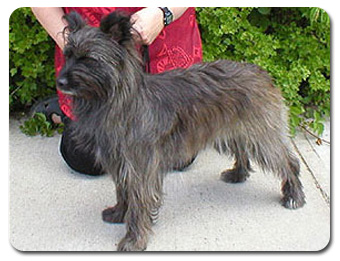
Berger des Pyrenees
Group: Herding Group
Origin: France
Height: 15-19 inches (38-48 cm)
Weight: 18-32 lb (8-14 kg)
Varieties: Rough-Faced and Smooth-Faced
Also Known As: Pyrenean Sheepdog; Pyrenean Shepherd

UKC Ch Weskeys Arielle de La Brise, CKC pointed *Breeze*
Photo: Weskeys Kennels
CLICK HERE to View Breeder Listings
Breed Profile
The Berger des Pyrénées is the traditional working companion of the larger Great Pyrénées. Working together, they help the shepherd with his herd of sheep or other livestock. The breed is rare outside of his homeland of France, but his popularity has grown significantly since the early 1970’s.
He is a hardy, assertive, tough herding dog with incredible energy. Ever vigilant and alert, he never misses anything that is going on around him. He has a devoted and obedient nature making him ideal to be included in all family activities. He excels at herding, agility, flyball, tracking, protection, obedience, and rescue work, to name a few.
The Pyrenean Shepherd is naturally suspicious of strangers so early and extensive socialization is important. This natural trait along with his affection and devotion to his family make him a very good watch dog. He is bright, inquisitive and intelligent, cunning and mischievous in attitude and expression.
The Pyrenean Shepherd comes in two varieties — the Smooth-Faced and the Rough-Faced. Both types come in various colours.
Health Issues
The Pyrenean Shepherd is a very healthy breed. However, like all breeds there are certain genetic disorders that have been found including hip dysplasia, epilepsy, and PRA.
If you are considering the adoption of a Berger des Pyrenees puppy, or any breed, it is very important to be selective in choosing a responsible and reputable breeder. Ensure that the prospective puppy’s parents have all health clearances, this should include hip x-rays and eye testing. Breeding of any dog should not be done until after they have been proven to be free of evidence of significant hereditary diseases. (For more information on selecting a breeder, see the articles on the General Information page.)
Additional Health Resources:
- Health and Nutrition — Growing section of the Canada’s Guide to Dogs website which includes information on several health and nutrition related issues.
- Canine Health Information Center (CHIC) — Providing a source of health information for owners, breeders, and scientists that will assist in breeding healthy dogs. CHIC is a centralized canine health database jointly sponsored by the AKC/Canine Health Foundation (AKC/CHF) and the Orthopedic Foundation for Animals (OFA).
- AKC Canine Health Foundation — Working towards developing scientific advances in canine health.
- OFA – Companion Animal Eye Registry (CAER)
- Orthopedic Foundation for Animals (OFA)
- Ontario Veterinary College (OVC)
- University of Pennsylvania Hip Improvement Program (PennHip)
- HealthGene — HealthGene Corporation is the leading provider of veterinary DNA diagnostic services in Canada.
- Labgenvet — Laboratory of Veterinary Genetics is a Canadian diagnostic laboratory that offers a comprehensive service of DNA tests for veterinary genetic diseases.
Grooming Information
Although the two varieties of Pyr Shep coats appear to require a lot of maintenance, the coats are actually quite easy to keep in good condition. Weekly brushing is recommended, especially for the long-haired coat which can cord if not brushed.
- Grooming — This section of the Canada’s Guide to Dogs website includes tips, articles and information covering all aspects of dog grooming along with a listing of Groomers from across Canada.
Training Resources
As with all breeds, proper training and socializing is important and due to the Pyrenean Shepherd’s natural suspicion of strangers, early socialization is highly recommended.
- Training — For training information, see this growing section of the Canada’s Guide to Dogs website for tips, articles, as well as listings of training centres across Canada.
Additional Information
- Is a Dog from the Herding Group Right for You?
- Herding Dogs — A section of the Canada’s Guide to Dogs website which includes training and general information about Herding/Stock Dogs; listing of Stock Dog Clubs and Associations; listing of upcoming shows and events; and more.
- Clubs, Sports & Activities — For information on the many sports and activities you can get involved in with your dog.
- Working Dogs — The Working Dogs section of the Canada’s Guide to Dogs website provides information and listings of organizations that are involved in various dog jobs, such as Guide Dogs, Therapy Dogs, Police Dogs, Protection Dogs, and much more.
*NOTE 1: CHIC – The Canine Health Information Center “is a database of consolidated health screening results from multiple sources. Co-sponsored by the Orthopedic Foundation for Animals (OFA) and the American Kennel Club (AKC) Canine Health Foundation, CHIC works with parent clubs to identify health screening protocols appropriate for individual breeds. Dogs tested in accordance with the parent club established requirements, that have their results registered and made available in the public domain are issued CHIC numbers.” To learn more, visit: www.caninehealthinfo.org
*NOTE 2: The Fédération Cynologique International (FCI) is the World Canine Organization, which includes 91 members and contract partners (one member per country) that each issue their own pedigrees and train their own judges. The FCI recognizes 344 breeds, with each being the “property” of a specific country. The “owner” countries write the standards of these breeds in co-operation with the Standards and Scientific Commissions of the FCI, and the translation and updating are carried out by the FCI. The FCI is not a breed registry nor does it issue pedigrees.
Breed Listing
Quick Links
Get In Touch
- Email: canadasguidetodogs@gmail.com
- Email: info@canadasguidetodogs.com
- Visit us on Facebook: www.facebook.com/CanadasGuideToDogs
— CanadasGuideToDogs.com is an Amazon Associate as well as a participant in various affiliate programs, as such fees are earned from qualifying purchases.
